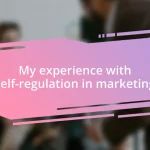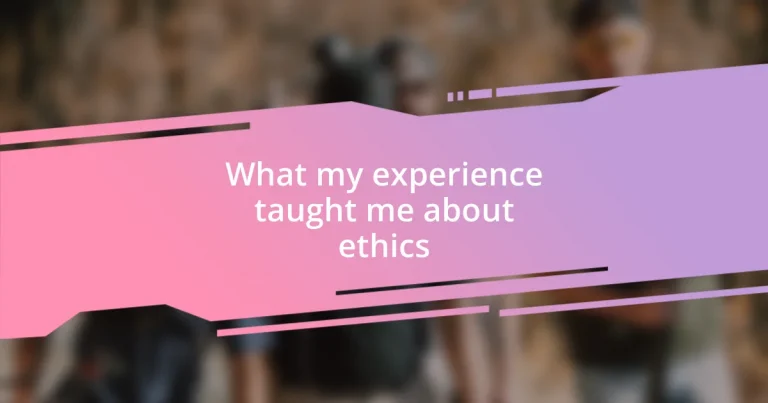Key takeaways:
- Understanding personal ethics is essential for guiding decisions, fostering trust, and building authentic relationships in both personal and professional contexts.
- Confronting ethical dilemmas requires courage and integrity, as taking the right path often means prioritizing long-term values over short-term gains.
- Encouraging open discussions about ethics within teams cultivates a supportive culture where individuals feel safe to share experiences and learn from one another.
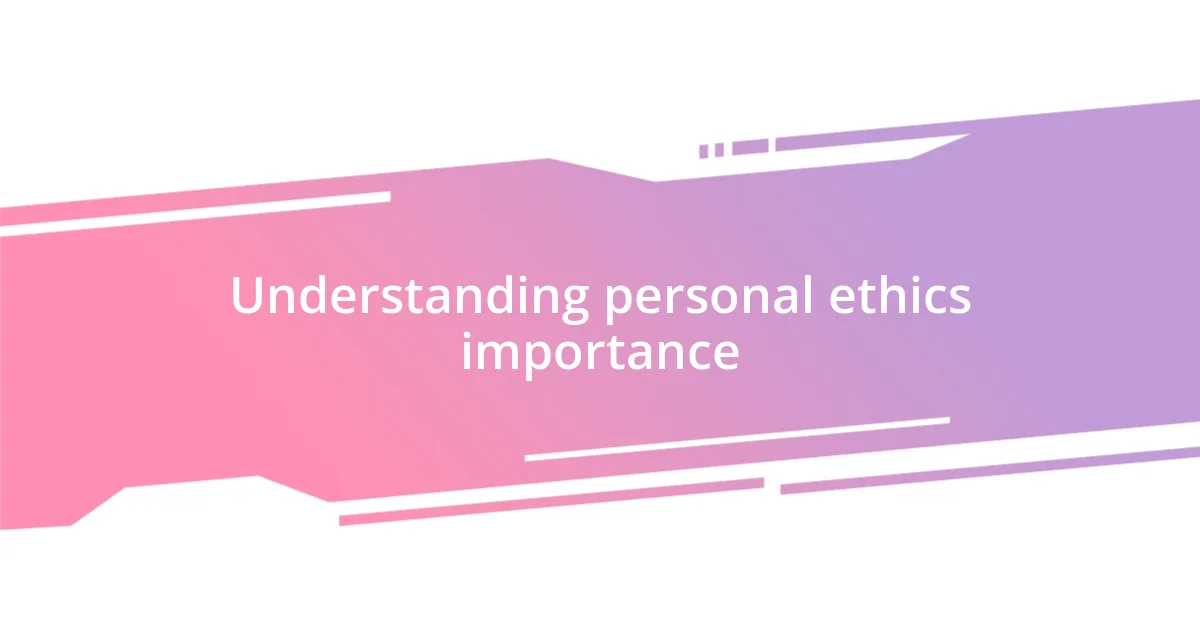
Understanding personal ethics importance
Understanding personal ethics is crucial because they serve as our internal compass, guiding our decisions in both professional and personal realms. Reflecting on my own journey, I remember a time when I had to choose between a job promotion and my integrity. It was a tough call, but prioritizing my values led me to a more fulfilling pathway, reinforcing how essential it is to know what we stand for.
When faced with dilemmas, personal ethics remind us of our commitments and responsibilities. I fondly recall a situation where I had a colleague who consistently bent the rules for personal gain. Witnessing this behavior made me question, “What kind of professional do I want to be?” That experience taught me that maintaining strong ethics isn’t just about rules; it’s about building trust and credibility with those around us.
Moreover, understanding personal ethics helps us cultivate authentic relationships. I’ve seen firsthand how transparency in our actions fosters a sense of community and respect. When I chose to be honest during a difficult conversation with a friend, it not only strengthened our bond but also reinforced my belief that true connections are built on shared values and integrity. Isn’t it incredible how our choices reflect who we are at our core?
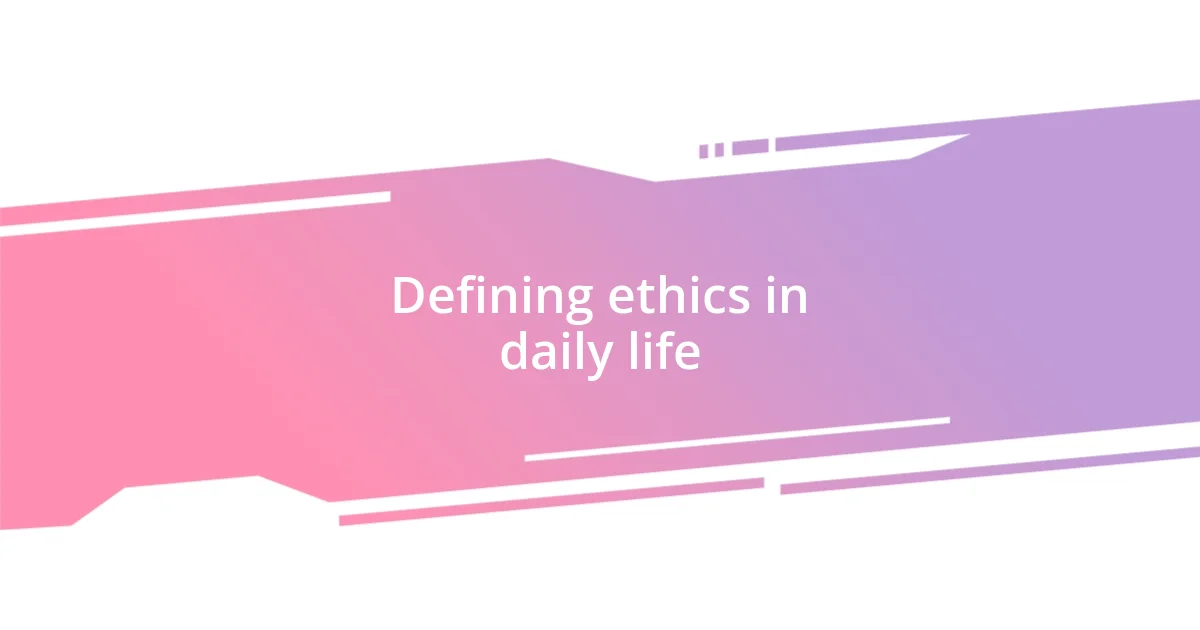
Defining ethics in daily life
Defining ethics in daily life extends beyond mere words; it’s about how we choose to act when no one is watching. For me, one defining moment was when I witnessed a coworker taking credit for a project we collaborated on. It stung—seeing how easily some can overlook integrity for personal gain. It taught me that standing up for what’s right, even when it’s uncomfortable, is a key part of my ethical framework.
In daily interactions, ethics are woven into the choices we make. Here are some aspects of ethics I consider essential:
- Honesty: I prioritize speaking the truth, as even small lies can erode trust.
- Respect: Treating others with dignity, regardless of their status, creates a harmonious environment.
- Responsibility: Taking accountability for my actions, especially when mistakes occur, builds resilience.
- Fairness: I strive to be impartial, ensuring everyone gets a fair shake in both professional and personal matters.
- Compassion: Being empathetic can shift my perspective and help understand others’ viewpoints better.
These principles resonate with me in everyday life, reminding me just how vital it is to practice ethics consistently.
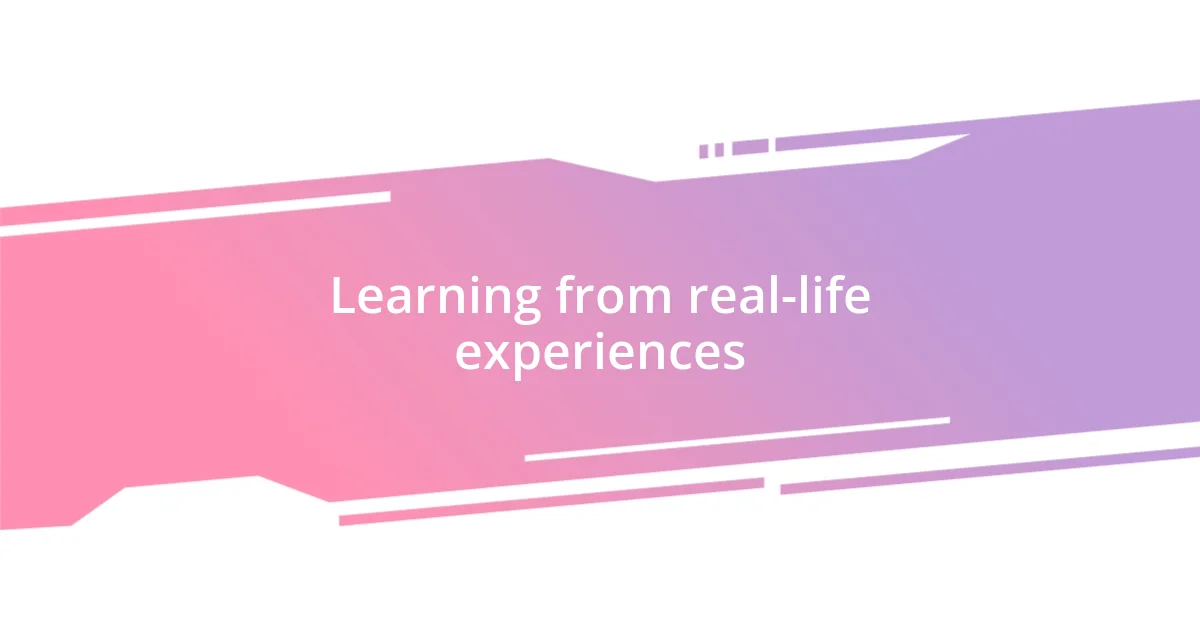
Learning from real-life experiences
Reflecting on my own experiences, I’ve come to realize that real-life challenges are often the best teachers. I recall a pivotal moment in my early career when I overheard a manager discussing how to manipulate performance metrics to make their team look better. It was shocking to me, and I found myself torn between fitting in or voicing my concerns. Ultimately, I chose to speak up. That experience solidified my understanding that ethical decisions can be uncomfortable but are essential for long-term integrity, reminding me that the easy path is seldom the right one.
In another instance, a close friend faced a tempting opportunity to engage in unethical business practices that promised quick profits. As they shared their thoughts with me, I felt an overwhelming sense of responsibility to convey the potential repercussions, not just for their career but for their character. The emotional connection we shared during that discussion emphasized how our ethics impact not only ourselves but those around us. It was a lesson in the importance of courage in our conversations, a challenge I now embrace.
When I think about how experiences shape our ethical understanding, I remember volunteering for a non-profit organization. I met individuals from diverse backgrounds who had faced tremendous hardships. Their stories of resilience and moral dilemmas pushed me to reconsider my own biases and preconceived notions. It reinforced the idea that ethics isn’t just theoretical; it’s a living, breathing concept shaped by our interactions and the stories we tell each other.
| Experience | Insight Gained |
|---|---|
| Handling unethical practices at work | Valued integrity over conformity |
| Advice to a friend on business ethics | Courage and open dialogue matter |
| Volunteering and listening to diverse stories | Ethics is influenced by our interactions |
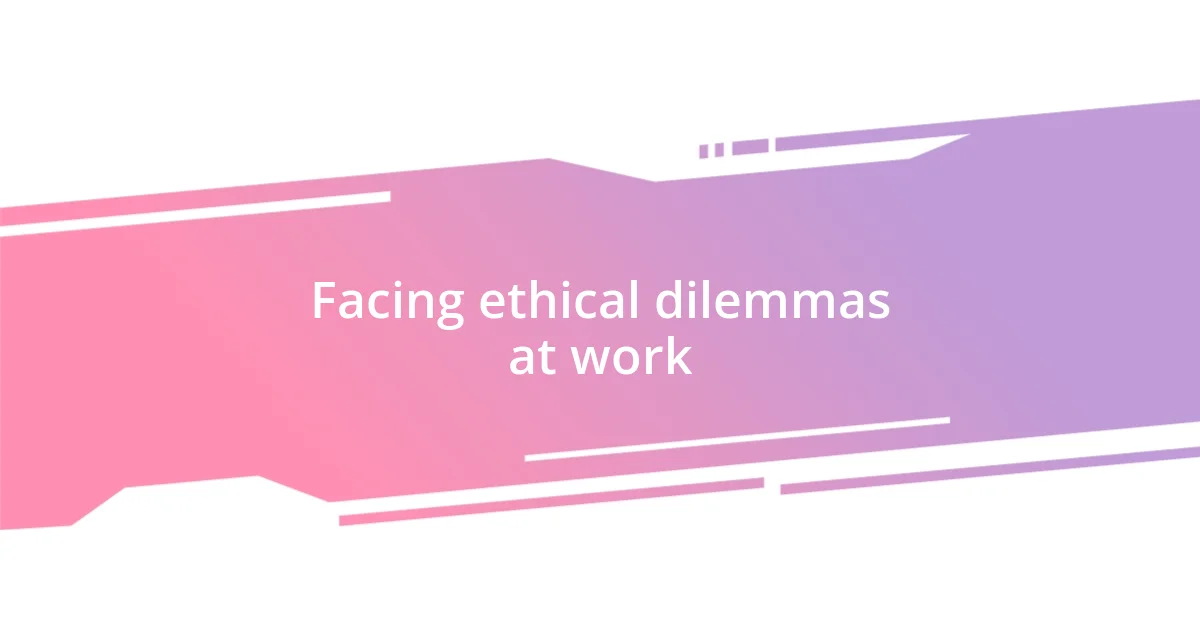
Facing ethical dilemmas at work
Facing ethical dilemmas at work often leaves you wondering, “What’s the right thing to do?” I remember a time when our team was under pressure to meet a tight deadline. A colleague suggested we shortcut our testing process to save time. It felt like the air got thick with tension, knowing that taking that route could compromise quality and potentially harm our clients. In that moment, I realized that choosing integrity over convenience isn’t just a moral obligation; it’s a foundational decision that shapes trust in our team.
I once found myself in a position where a manager asked for personal favors that crossed professional boundaries. It was a tight spot. Should I comply to maintain peace, or stand my ground and risk my position? I chose the latter. That experience was enlightening; it taught me that ethical decisions often require courage, and that standing firm fosters respect—even if it means facing uncomfortable outcomes.
In reflecting on these situations, I often ask myself how I can cultivate a workplace culture grounded in ethics. It’s essential to create an environment where ethical discussions are open and encouraged. I have since advocated for regular team check-ins about our core values. It’s surprising how sharing experiences can build a stronger ethical framework. After all, if we don’t talk about ethics, how can we expect to navigate dilemmas with confidence and clarity?
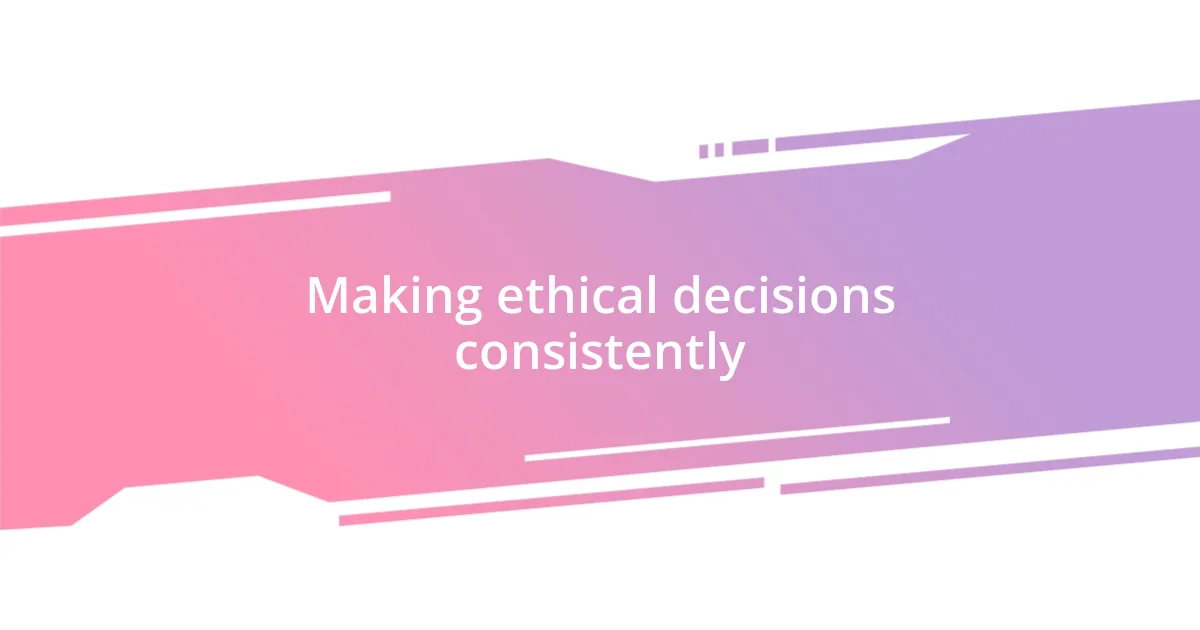
Making ethical decisions consistently
Making ethical decisions consistently requires a conscious effort and active reflection. I recall a project where I was tempted to manipulate a timeline to appease a demanding client. I paused and asked myself, “What would I want if I were in their shoes?” That simple question guided me to communicate transparently instead. I found that honesty, even when uncomfortable, built a more solid relationship, reminding me that integrity isn’t a one-time choice but a habitual practice.
It’s fascinating how circumstances can either challenge or reinforce our ethical stance. I remember a time when a peer misrepresented their work to gain favor with our boss. Witnessing this sparked a conflict within me: should I report it or let it slide? After much deliberation, I chose to share my concerns privately with my peer. This not only fostered an open dialogue but also prompted them to re-evaluate their actions. In instances like these, I’ve learned that ethical choices often ripple beyond ourselves, affecting those around us.
There are moments when I’ve faced ethical dilemmas that felt like being at a crossroads. For instance, I once had to decide whether to overlook minor infractions by a fellow employee for the sake of team harmony. I realized that consistently making ethical decisions means holding myself accountable—both for my actions and the actions of others. I pondered, “What kind of culture do I want to support?” This reflection helped me understand that fostering an ethical environment means being vigilant and proactive, encouraging everyone to strive for integrity together.
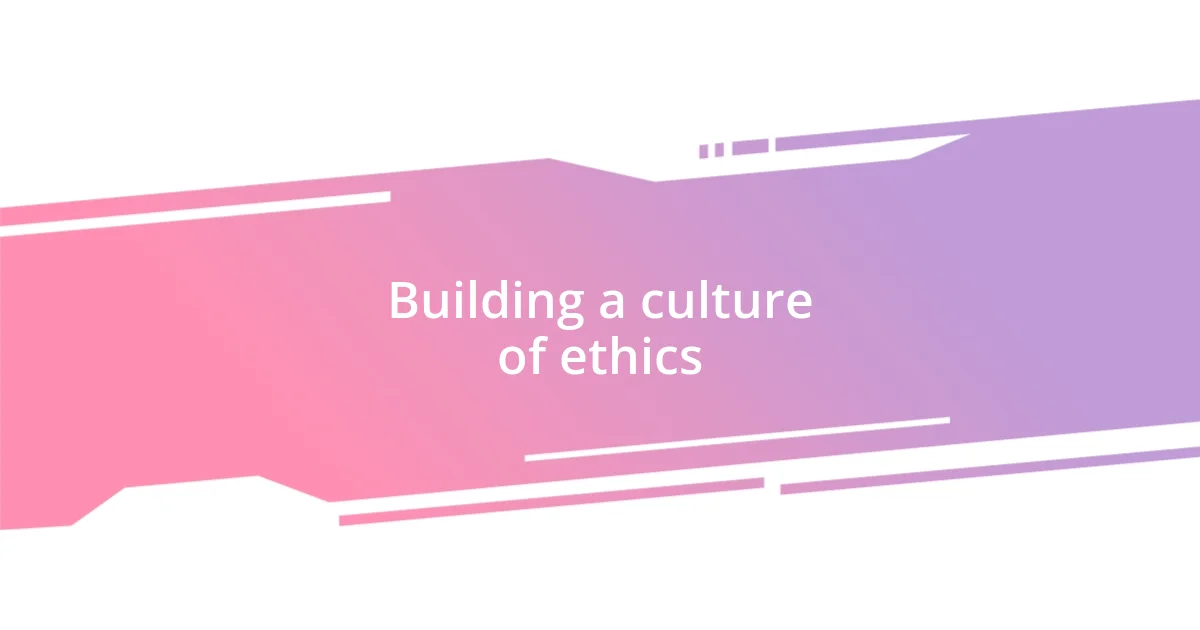
Building a culture of ethics
Creating a culture of ethics isn’t just about policies and procedures; it’s about fostering an environment where people feel safe discussing ethical concerns. I remember a time when I initiated a casual lunch-and-learn session focused on ethics in our workplace. It was surprising how many of my colleagues wanted to share their thoughts; it turned out we all felt the weight of those unspoken dilemmas. This gathering opened my eyes to the shared struggles we face. When we normalize these conversations, we not only strengthen trust but also reinforce our collective commitment to ethical behavior.
One impactful moment was when someone in our team confessed to feeling pressured to take shortcuts on a project. Instead of shaming them, we leaned into it as a learning opportunity. I felt a mix of empathy and determination; the experience reminded me that vulnerability is powerful. Encouraging team members to express their ethical uncertainties can lead to profound transformations. After all, if we don’t create space for honesty, how can we expect to uphold integrity in our actions?
In my view, leading by example plays a pivotal role in building that ethical culture. I’ve made a point to share my own experiences—both successes and failures—during our team meetings. This method of sharing not only humanizes leadership but also empowers others to do the same. Think about it: if leaders openly navigate their ethical challenges, wouldn’t it inspire everyone to act with courage? Through these experiences, I’ve realized that a thriving ethical culture requires ongoing engagement and a shared commitment from everyone involved. It’s not just about doing what’s right; it’s about growing together in our understanding of what that means.
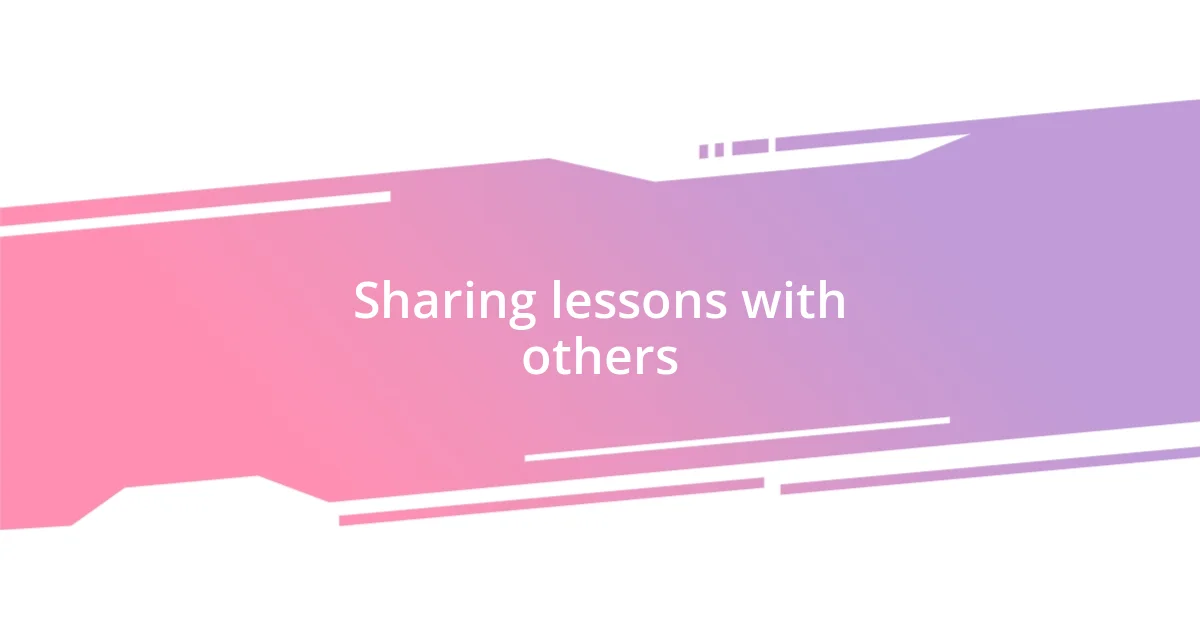
Sharing lessons with others
Sharing lessons with others is a dynamic way to cultivate a deeper understanding of ethics. I remember once mentoring a junior colleague who faced a moral dilemma about reporting a minor unethical act by a client. As we discussed it, I shared my own experiences of feeling torn between the desire for comfort and the need for integrity. That moment of vulnerability opened the door for genuine reflection, encouraging them to embrace the discomfort of ethical decision-making. Isn’t it fascinating how our stories can illuminate paths for others?
I’ve often found that conversations around ethics become richer when we invite diverse perspectives. In a team meeting, I encouraged everyone to share a challenging ethical moment in their careers, leading to a blend of laughter and insightful discussion. I was amazed at the courage it took for some to share their fears and regrets. It was a reminder that everyone wrestles with their own ethical battles, and by sharing our narratives, we can learn invaluable lessons from one another. In a way, do we not all crave that sense of connection when it comes to navigating right and wrong?
One particularly poignant experience stands out. During a volunteer project, we had to make collective decisions on resource allocation that would significantly impact vulnerable communities. As tensions arose about fairness and priorities, I realized the power of collaborative dialogue. We listened, shared our fears, and challenged each other’s assumptions. This not only strengthened our teamwork but also deepened our commitment to ethical responsibility. Isn’t it rewarding when sharing lessons leads to both personal growth and greater collective impact?











